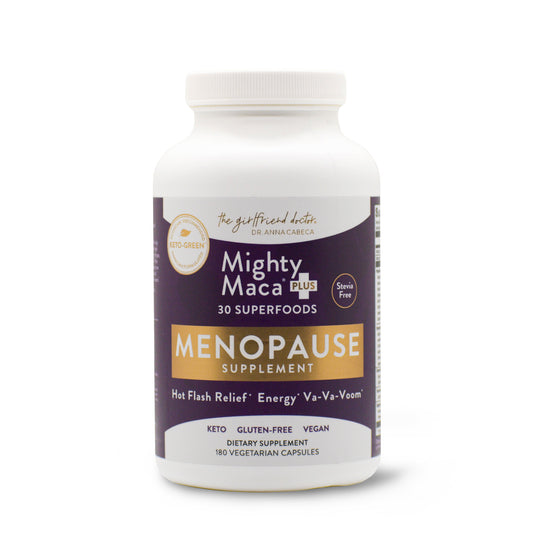Your doctor may have told you that your brain fog, insomnia, mood swings and/or anxiety are just a natural part of aging. To deal with those symptoms perhaps you’ve even been prescribed an anti-depressant or anti-anxiety med, or something to help you sleep. You might also be soldiering through other perimenopausal or menopausal symptoms such as hot flashes, PMS and vaginal dryness.
It’s all just a mandatory part of women aging, after all, right?
But what if we knew that the female brain, as a woman ages, is often not getting the fuel it needs to remain metabolically active and strong? What if we knew that these types of common neurological symptoms that so many of us experience are a sign of an underlying dysfunction happening over decades of a woman’s life…and that this vulnerability increases our risks for cognitive decline, dementia, and even Alzheimer’s disease?
And what if we knew there is something women can do about it, starting today?
Well, we do know… a lot…so let’s talk about that…
First, here are some important facts relating to the “neurological vulnerability” we women experience:
- 80% of women report neurological symptoms (brain fog, memory lapses, cognition degradation, mood swings, anxiety, depression, loss of libido) during menopause.
- Estrogen preserves brain health for women and we know that estrogen declines with age. Research has shown that decreases in estrogen levels impact our brain’s fuel source, starving our brain of needed energy. Our brain’s ability to detox itself from harmful cells is also degraded. It’s no wonder we experience so many neurological symptoms as our hormones decline during the perimenopause and menopause.
- Medical menopause (halting a woman’s estrogen production) has been correlated with increased risks of Alzheimer’s: the surgical removal of a woman’s two ovaries can increase a woman’s risk of Alzheimer’s by up to 70% if no estrogen hormone replacement therapy is provided.
- Women are more likely to experience metabolic disease states (insulin resistance, Type 2 diabetes, hypertension, and obesity) as they age, and the risk for these disease states increases during menopause. These metabolic changes have been associated with increased risk for Alzheimer’s disease.
- In brain imaging studies there is a drop in energy activity inside the brain and a worsening of accumulated Alzheimer’s plaques seen as women go through perimenopause, menopause, and postmenopause.
- In brain imaging studies perimenopausal and postmenopausal women show Alzheimer’s disease-like reductions in glucose metabolism and reduced mitochondrial activity. We know decreasing estrogen levels impact glucose metabolism and mitochondrial health.
- Depression in midlife is believed to increase the risk of Alzheimer’s disease by as much as 70% and women have twice the risk of depression compared to men; this difference worsens when women go through the menopausal transition. Depression and mood disorders have been associated with declining estrogen levels.
- Almost two-thirds of Americans with Alzheimer's are women.
What do these facts tell us? Women are different than men (we all knew that already, right?) and our biology makes us more neurologically vulnerable as we transition to and through menopause.
While there are many factors that contribute to this, our declining estrogen levels are one major reason, as it affects our brain’s fuel source.
Setting the Stage for Women’s Neurological Vulnerability
I remember a great podcast I did a few years ago with Dr. Edwin Lee, an expert in bio-identical hormones. We had been talking about how a woman’s hormone decline and simply the state of “being in menopause” itself was a dangerous disease state for women that put them at greater risk for dementia, Alzheimer’s disease, and many other chronic diseases as well. That was such an interesting discussion as we talked about the use of bio-identical estrogen and progesterone hormone replacement therapy as a preventive strategy for women’s brains!
Estrogen, in particular, is very tied to a woman’s every day and long-term brain health. It is both protective and preventative.
Estrogen’s role relating to brain health is to transport the glucose needed to support the mitochondria in the brain. Think of mitochondria, located throughout the body and brain, as our body’s energy factories. So estrogen supports the ability for your brain to produce needed energy (which is very important for everyday functionality as well as our brain’s longevity). Decreased levels of estrogen have been shown to negatively affect glucose metabolism and mitochondrial function. Some researchers believe that the resultant metabolic state from this may actually be a biomarker for increased Alzheimer’s risk.
Treatment with increased levels of estrogen has been shown to increase glucose uptake by the brain, improve the metabolic activity within the brain, and improve cognitive function and memory. One study focusing on postmenopausal women found estrogen therapy to be protective against metabolic decline in the particular region of the cortex that typically declines in the early stages of Alzheimer’s disease.
The challenge is that estrogen therapy isn’t a viable option for some women, either due to breast cancer concerns, other underlying health issues or a woman’s age (turns out the timing of oral estrogen hormone replacement therapy matters relating to its impact on brain health, with the perimenopause the optimal time for our estrogen receptors to positively influence and prevent neurological dysfunction. You can read more about this “window of opportunity” theory here.
The good news, though, is that fasting can provide an alternative fuel source for our brains (via a chemical that our body produces during fasting called ketones). Ketones can take-up the slack in providing neuroprotective effects when estrogen levels start to wane. Fasting can also provide other important brain benefits such as detoxing our brain of harmful cells and helping us control our insulin levels (show to be harmful to healthy brain metabolism).

What is Fasting and What Does it Have To Do with Our Brain?
Fasting is when we restrict ourselves from the intake of food, not through intentional calorie restriction, but through meal timing restrictions. It’s all about WHEN we eat…much more than WHAT we eat (although clearly, we can’t be eating Big Macs and fries during our feeding window!)…
My Keto-Green® diet and lifestyle program encourages the use of a type of fasting called intermittent fasting (also referred to as time-restricted feeding), with a fasting/feeding timing goal of approximately 16/8 hrs. The period you are fasting, starting after dinner should ideally be about 16 hours, although in my programs we always start much lower than that, at 12 hours or so. This means the window in which you should be “feeding” should eventually be around an 8 hour period. Before you panic, know that reducing your feeding window isn’t that difficult as a chunk of the fasting time is spent sleeping, after all!
What happens when we eat three meals (and don’t forget the snacks) each day?
When we eat our body produces insulin to control our rising blood glucose levels. Insulin helps get glucose into our body’s cells. Glucose is stored as glycogen in the liver and muscles; it is the body’s main source of energy. Insulin levels are meant to naturally decline after it does its job of moving out all of the glucose.
However, if you eat too often – especially foods such as carbs that spike your glucose even more - your insulin levels remain high. Eventually, you can lose insulin sensitivity (also known as insulin resistance), which can lead to Type 2 diabetes and other metabolic issues. It is also a risk factor for Alzheimer’s disease. High levels of insulin also signal to your body to go into a fat-storage mode instead of a fat-burning mode.
If you look at the following chart it may help you visualize what is happening. With every glucose spike, there is insulin being pumped out into your bloodstream.
Remember, even if your body is overloaded with glucose if your estrogen levels are low the glycolytic pathway (where the glucose is transported for use by the mitochondria) is not going to be functioning well. Your brain won’t be able to use the glucose and will be starved for fuel. You will also be at risk for insulin resistance and garbage cells can literally start to stack up. So this is where fasting and ketones can be beneficial.
When you fast (after 12 hours or so of not eating) your glycogen (glucose) reserves run out. Your body then needs a new energy source and it releases fat cells into the bloodstream. These travel to your liver and are burned for energy.
Your body starts burning fat (this is the metabolic state of ketosis) and your insulin levels decrease. Ketosis can occur as a result of fasting and as a result of eating a ketogenic type of diet. During ketosis, our body releases chemicals called ketones. Ketones are a sign your body is achieving the health benefits of ketosis.
The challenge with our traditional diet today is that we consume carb-heavy breakfasts, heavy dinners (often late at night), late-night snacks, alcohol, and sugary sweets. All of this high-energy and constant glucose inhibits our body from making the metabolic switch from glycogen (glucose) to ketones (a much healthier metabolic state!!!) unless we take action.
Here is a summary of the health benefits we can achieve when we do take action (like with fasting)…when switching from glucose to ketones as the major cellular fuel source for the body and brain:
The Health Benefits of Fasting Include:
- Getting to and maintaining a healthier weight (we become more efficient fat burners and our cravings are reduced)! The research supports this…and intermittent fasting, in particular, has high compliance rates; meaning it isn’t as hard as many types of diets to maintain and most importantly…to sustain… and turn into a lifelong habit. So important, it is a lifestyle change not a temporary diet.
- Fasting increases metabolic function and helps reset our natural circadian rhythm. This supports healthy hormone production, a healthier gut microbiome and a better night’s sleep. Shift-worker studies have found elevated insulin and other negative metabolic changes due to night-shift work and night-time eating. Emerging animal research points out that maintaining an internal circadian clock via daytime feeding, taking in the bulk of food/energy earlier in the day and reducing meal frequency, may positively affect the gut microbiome, potentially reducing leaky gut and inflammation.
- Fasting improves insulin sensitivity. Fasting leads to a reduction in blood glucose and insulin levels. Insulin resistance has become a comorbidity of menopause, with an increased prevalence of insulin resistance seen in postmenopausal women (here’s a great podcast focused on the dangers of insulin and metabolic diseases for women). Insulin resistance is associated with an increased risk of diabetes, breast cancer, and cardiovascular diseases; it is also associated with increased risk for Alzheimer’s disease.

Fasting ensures ketones are available as a powerful alternative fuel source for your brain (instead of carbs and glucose). Remember, given a women’s natural decline in estrogen, glucose can’t be as effectively transported and utilized by the brain for fuel. During fasting, however, ketones can be used to ensure continued support for our mitochondrial health.Fasting and Alzheimer’s
Many scientists believe that ketones could someday be a therapeutic approach to preventing Alzheimer’s disease. Long used as a successful adjunct treatment strategy in epilepsy as well as other neurodegenerative disorders, ketones have been found to actually suppress amyloid (the hallmark biomarker for Alzheimer’s disease) accumulation and improve memory and learning in mouse models of Alzheimer’s disease. Many animal studies have found that ketones provide a wide variety of protective benefits to brain neurons.
In such animal studies, along with improvements to brain health, intermittent fasting has been shown to extend the average lifespan by up to 40% and protect against major chronic diseases, including diabetes, kidney disease, and cancer. These studies (as well as observational studies in humans) support many researchers’ initial conclusions that too much food too often, devoid of the glucose-ketone (fasting) and ketone-glucose (refeeding) metabolic switching brought on by fasting, renders the brain prone to Alzheimer’s disease.
More human studies are necessary (and thankfully there are some currently underway) to solidify the findings as most of the available clinical (human) research relating to ketones and Alzheimer’s disease has come from studies on ketogenic diets versus simply assessing the impact of fasting (it is difficult to do studies on fasting given that participants can’t be blinded to the fact that they are in the “fasting” group versus the “non-fasting” group!).
Keep in mind the research focused on ketogenic diets and Alzheimer’s is generally focused on ketones and their specific health benefits, and fasting also produces ketones. A few other ketone related studies have shown that supplementation with MCT (medium-chain triglycerides that kick start people into producing ketones) by people having mild to moderate Alzheimer’s disease show improvements to cognitive function.
Much of the research is summarized here in an interesting 2019 research article relating to ketogenic diets and Alzheimer’s should you want to learn more.
If you read the study you’ll see fairly clearly that while there are multiple factors believed to be involved, mitochondrial dysfunction and damaged cells (the lack of autophagy), along with poor antioxidant status, have been identified as strong mechanisms of Alzheimer’s disease pathogenesis.
And just as clearly you will see how ketones appear to perform metabolic therapy for our brains, improving brain metabolism and supporting mitochondria health.
Two other connections to Alzheimer’s prevention related to fasting are how fasting improves insulin sensitivity and ensures the all-important process of autophagy.
Insulin Resistance - A Major Metabolic Risk Factor
Insulin resistance has been shown to be a risk factor for Alzheimer’s with studies showing that insulin signaling is impaired in the brains of Alzheimer’s patients and Alzheimer’s experimental models.The good news is that improving insulin sensitivity results in healthier brain function, and fasting has shown it can reduce insulin resistance. Several ongoing clinical trials are assessing this now using intranasal insulin on Alzheimer’s patients to address the damaging effects of insulin resistance. These trials will validate whether addressing insulin resistance, in diabetics in particular, will provide neuroprotective effects and improve memory deficits.
Autophagy - Brain Detox and Improved Stress Response
Research is demonstrating just how important fasting can contribute to your body’s ability to clean out dangerous garbage cells from your body, a process called autophagy. The malfunctions that can occur without this ‘”detox” are likely key to influencing neurodegenerative disorders, including Alzheimer’s disease. Autophagy plays a positive role in the metabolism of amyloid and tau protein, can decrease neuroinflammation, and improve insulin sensitivity.
Perhaps even more important, after cleaning out cellular garbage through autophagy your body actually activates stem cells and increases mitochondrial production. It kicks starts a period of cell growth, strengthening cellular stress resistance and increasing neuroplasticity within the brain. This is important as researchers believe that this metabolic switching (fasting/feeding) process may improve our brain’s ability to cope with additional future stress (environmental or otherwise) and disease processes such as found in metabolic conditions (insulin resistance, diabetes, etc.) and Alzheimer’s.
So Should YOU Try Intermittent Fasting To Support Your Brain?
There are a number of clinical studies underway to specifically evaluate fasting and cognitive performance in humans, including one with Dr. Mark Mattson, a leading researcher very focused on the impact of intermittent fasting on brain health and Alzheimer’s disease. I’ll be monitoring those and will report their findings back to you as they are shared in published work. The results appear promising and supportive of results thus far relating to cognitive improvements and brain health.
In the meantime, based on all of the proven health benefits of fasting, as well as the many positive findings related to ketones perhaps being brain health super fuel, I believe that intermittent fasting can be a beneficial strategy for most women (and men), along with eating a Keto-Green® diet as well. Both help address the issue of reduced estrogen as we age and how that starves a woman’s brain. Both reduce insulin resistance issues and support our brain’s underlying metabolic health.
Fasting, especially intermittent fasting, has high compliance rates and no documented safety concerns. Intermittent fasting isn’t that difficult to incorporate as an ongoing lifestyle choice. It has been shown to help people reduce unhealthy weight by becoming more efficient fat burners (and a healthier weight comes with its own set of metabolic benefits), reduce cravings and result in improved mental clarity, self-esteem and mood.
Remember, studies have shown that early disturbances in brain glucose metabolism (such as what can occur without adequate estrogen support) can be detected before measurable cognitive decline. So why wait...don’t we want to be preventative?
Connect with me on Facebook and let me know how you are doing with your fasting efforts. And please note, fasting - or any dietary changes - should not be done without your doctor’s approval, especially if you are under treatment for a medical condition or are a Type 1 diabetic. Fasting is also not recommended during pregnancy, breastfeeding or for children.
P.S. - Looking for a little extra self care?
Ensuring you are getting complete nutrition is one of the easiest ways to make sure you are caring for yourself. Mighty Maca® Plus a physician formulated blend of 42 of the world's most regenerative superfoods that can help to balance hormones, fight free radicals, improve digestion, and more...
Pick up a free sample HERE!
References
- https://www.ncbi.nlm.nih.gov/pmc/articles/PMC6356942/
- https://www.ncbi.nlm.nih.gov/pmc/articles/PMC6400070/
- https://www.ncbi.nlm.nih.gov/pubmed/30925707
- https://www.ncbi.nlm.nih.gov/pmc/articles/PMC3017674/
- https://www.ncbi.nlm.nih.gov/pmc/articles/PMC6314618/
- https://www.ncbi.nlm.nih.gov/pubmed/30925707
- https://www.ncbi.nlm.nih.gov/pmc/articles/PMC3753111/
- https://www.ncbi.nlm.nih.gov/pmc/articles/PMC5913738/
- https://www.ncbi.nlm.nih.gov/pmc/articles/PMC6720297/
- https://www.frontiersin.org/articles/10.3389/fnins.2018.00830/full
- https://www.ncbi.nlm.nih.gov/pmc/articles/PMC6314618
- https://www.ncbi.nlm.nih.gov/pmc/articles/PMC5797541/
- https://www.ncbi.nlm.nih.gov/pmc/articles/PMC6119973
- https://www.ncbi.nlm.nih.gov/pmc/articles/PMC5066305/
- https://www.ncbi.nlm.nih.gov/pubmed/26923399
- https://www.ncbi.nlm.nih.gov/pmc/articles/PMC4960941/
- https://www.ncbi.nlm.nih.gov/pmc/articles/PMC5064803
- https://www.ncbi.nlm.nih.gov/pmc/articles/PMC5388543
- https://www.ncbi.nlm.nih.gov/pmc/articles/PMC4516560
- https://www.ncbi.nlm.nih.gov/pubmed/15582750
- https://www.ncbi.nlm.nih.gov/pubmed/10867223
- https://www.ncbi.nlm.nih.gov/pmc/articles/PMC2993571







